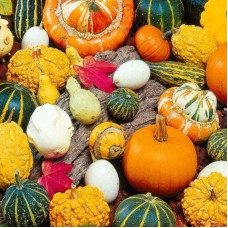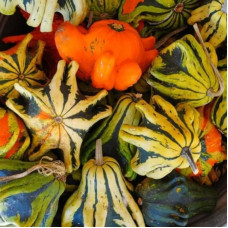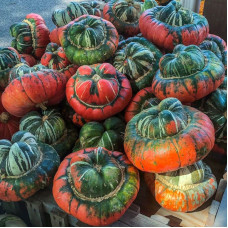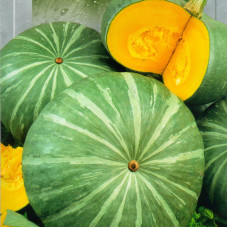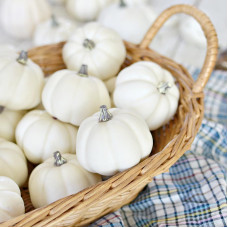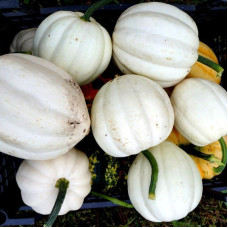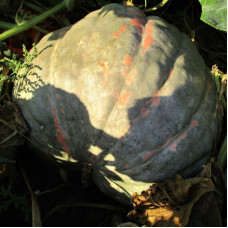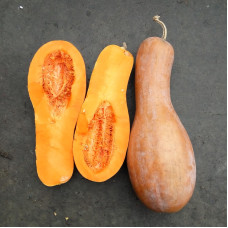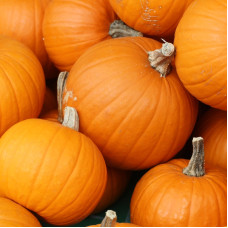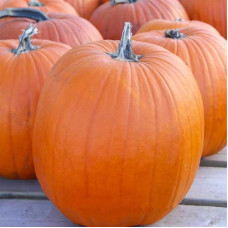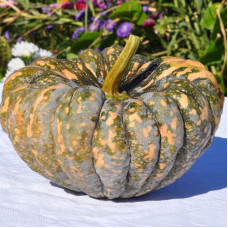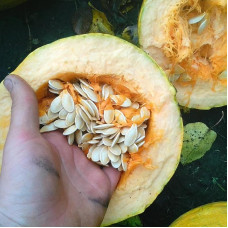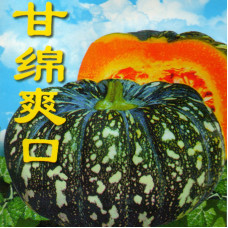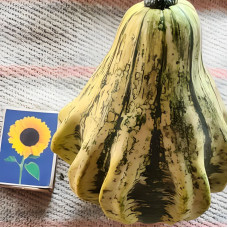In stock
Product Code: 16288
Decorative mix «Pumpkin mosaic» - decorative mix of the pumpkin family. Very attractive fruits of various shapes and colors, can decorate a gazebo, balcony, fence, and can also be used to create decorative compositions and interior design.
Light- ..
$0.99
In stock
Product Code: 15404
Decorative pumpkin Crown of Thorns / Cucurbita pepo small fruited - a decorative pumpkin with unusual fruits. They differ in shape and size. They are much smaller than the pumpkins used for food.
Crown of Thorns produces fruits with a diamet..
$1.49
In stock
Product Code: 15405
Decorative pumpkin «Turkish Turban» - a pumpkin with unusual bright fruits is grown to decorate a backyard or garden. The plant has beautiful leaf plates and large yellow flowers resembling bells. The shape of the pumpkins resembles a turban—a headpi..
$0.99
In stock
Product Code: 15181
Pumpkin «Medicinal» - early ripening variety. The plant is compact. The fruits are flattened in shape, light gray in color. The flesh is orange, thick, juicy, and sweet. The average fruit weight is 4-7 kg.
It is a table variety, stores well until ..
$0.99
In stock
Product Code: 16098
Pumpkin «Uhiki Kuri» (Uchiki Kuri) - a highly productive variety of Japanese pumpkin with high growth energy. The ripening period is 85-90 days. The variety was introduced to the market in 1933 by the Japanese breeder Matsumoto Saichiro and remains v..
$2.99
In stock
Product Code: 13653
Decorative pumpkin «Baby Boo» - a variety of decorative pumpkin. The vegetation period is about 100 days. The pumpkins are round, slightly flattened, segmented, painted creamy white, with smooth bark, small, reaching up to 10 centimeters in diameter ..
$2.49
In stock
Product Code: 16151
Pumpkin «Highlight» - late-ripening nutmeg variety for baby and dietary nutrition. Vegetation period 120-125 days. Long-vine plant. Fruit is cylindrical, orange, weighing 3-4 kg. The pulp is dark orange, dense, crispy, sweet, very tender.
Transpor..
$0.99
In stock
Product Code: 16150
Pumpkin «White acorn» / Cucurbita pepo - early ripening bushy productive variety. The period before ripening is 90 days. The fruits are round or flat-round, medium-ribbed, the color of the fruits ranges from snow-white to cream. The weight of the pum..
$2.49
In stock
Product Code: 16149
Pumpkin «Kavbuz » (Zdorovyaga, big guy) - this is the world's largest miraculous healing berry, a molecular hybrid of watermelon and pumpkin, inheriting the characteristic features of both parents, and exceeding them by 20-30% in yield. Kavbuz was ob..
$0.99
In stock
Product Code: 15956
Decorative pumpkin «Scheherazade Stars» - decorative fruits of the most diverse colors in the shape of stars. The plant is up to 400 cm long. Dry pumpkins serve as a magnificent decoration for various compositions. Used for vertical gardening, requir..
$0.99
In stock
Product Code: 15955
Pumpkin «Turka» - this is an early ripening variety that begins to bear fruit on the 86-98th day from germination. It forms bush-shaped plants with short, powerful lashes. Each bush produces two or three fruits weighing 4-6 kg. The bark is thin and h..
$0.99
In stock
Product Code: 15989
Pumpkin «Balsam» - high-yielding variety of late ripening period. The vegetation period is 125-130 days. The plant is long-stemmed, very powerful, the main stem reaches 3-4 meters in length. The fruits are flattened, colored brown, no pattern, reach ..
$0.99
In stock
Product Code: 15723
Decorative pumpkin «Ball bicolor» - is a small decorative flat-round pumpkin. The skin is dark green with thin yellow-green stripes. This is a very beautiful decorative pumpkin with a hard shell, which also has a long shelf life.
Because the fruit..
$0.99
In stock
Product Code: 4342
Decorative pumpkin «Turban» - is a fashionable, bright, eye-catching decoration for your garden, which, like ordinary table pumpkins, can be used for food!
Your garden will be decorated not so much by large yellow flowers or light green five-lobed..
$0.99
In stock
Product Code: 10834
Pumpkin «Candy» - is a high-yielding, especially sweet, mid-season variety (115-138 days from full germination to fruit harvest). The plant is long-climbing. The fruits are round, rough, segmented, weighing 1.2-1.8 kg (up to 3 kg).
The pulp is ver..
$0.99
In stock
Product Code: 10355
Muscat pumpkin «Guitar» - is a high-yielding variety with excellent keeping quality of fruits - up to 100 days. The period from germination to fruit removal is 110-120 days.
Fruits weighing 2-14 kg, in appearance resemble a guitar. The pulp is ver..
$0.99
In stock
Product Code: 10362
Pumpkin «Hundred pounds» (100 pounds)
Medium late variety. Vegetation period from germination to technical maturity is 110-140 days. The plant is long-branched, the central stem is 4-7m long.
The fruits are large, spherical, smooth, weighing 10..
$0.99
In stock
Product Code: 12903
Pumpkin «Steppe» - variety type Gray Volga 92. Fruits are formed on the main stem in 9-11 nodes in the amount of 1-2 pcs. Young ovary green. The fruit is flat, weakly segmented, without mesh, with an average weight of 6 kg. The color of the fruit is ..
$0.99
In stock
Product Code: 13120
Muscat pumpkin «Yanina» - mid-season nutmeg variety intended for cultivation with and without irrigation. From germination to the beginning of fruit ripening 105 days. The fruit is elongated-oval, slightly ribbed, orange in color, sometimes with gree..
$0.99
In stock
Product Code: 1296
Ornamental pumpkin (mix) - is an ornamental plant with very effective multi-colored fruits of various sizes and shapes. Seeds are sown in open ground in sunny areas in April-May. Ripe fruits with hard skin are collected in the fall before frost, drie..
$0.99
In stock
Product Code: 10660
Pumpkin «Beung karn» - is a productive, long-climbing variety. The fruits are round, flattened, ribbed, dark green in color, weighing up to 1.2 kg. The pulp is yellow-orange, very sweet and tasty. Used to make soups and pies...
$0.99
In stock
Product Code: 13096
Pumpkin «Danka Polka» - medium early table variety. The plant is medium-sized. The fruits are round, smooth, weighing 2.5-3.5 kg. The color of a mature pumpkin is orange-green with a marbled pattern. Bark of medium thickness. The pulp is starchy medi..
$0.99
In stock
Product Code: 15362
Pumpkin «Dawn of the East» - The plant is medium climbing, powerful. Fruit shape is slightly flattened to strongly flattened. The surface of the fruit is segmented, the bark is hard, the flesh is bright orange, dense, juicy, very sweet.
One of the..
$0.99
In stock
Product Code: 15559
Pumpkin decorative «Dragon Wings» - an annual plant with climbing or creeping shoots, ideal for planting arbors, fences or as a ground cover. In late summer and autumn, numerous original fruits appear in yellow, orange or green, reminiscent of exotic..
$1.99
Miscellaneous pumpkin seeds belong to the genus of herbaceous plants in the gourd family. There are annuals and perennials with a hard-rough or hairy structure. They creep along the ground and cling to stems and other objects with small branched antennae. During flowering, the plant is covered with large yellow or white flowers. Fruit – it's a pumpkin. It has a hard outer layer and is framed by a thick swelling of the seeds.
Pumpkin seed classification
Pumpkin is considered a valuable vegetable plant. Dishes from it bring benefits and harm to the body, depending on how you use the product. However, there are much more useful substances in the composition of the fruit. From it you can make delicious juices, jams, cereals and other dishes. To grow a beautiful and juicy fruit, you need to understand the varieties of seeds.
All gardeners classify pumpkin seeds and their fruits by appearance:
All gardeners classify pumpkin seeds and their fruits by appearance:
- Oval. Vitamin and winter varieties, as well as one hundred pounds, have this form.
- Oval-cylindrical. A popular shape for hard-barked types, namely Mozolievskaya 15.
- Round flattened. Large-fruited varieties may also have this shape. The most common types of – these are Kherson, Zhdana, Slavuta, as well as several sweet types.
- Elongated-cylindrical. A common appearance for the Muscat type, namely for the Arabat variety and sweet.
- Cylindrical. Large-fruited pumpkin varieties grow from seeds of this shape.
In the Ukrainian expanses, three varieties of pumpkin – large-fruited, nutmeg and hard-barked. They are easy to calculate and distinguish by the stalks. In the first type, it has a more round shape, similar to a cylinder. Muscat has the form of a pentahedron, expanding towards the base. And the hard-barked ones have a ribbed structure with pronounced grooves between the scars.
Pumpkin Features
When buying one or another species, you need to be well oriented in how to plant pumpkin seeds. A large-fruited variety appeared for the first time in Peru and Bolivia. It is well related to cold weather, germinates even at 12 degrees above zero. It is characterized by the largest fruits, which is why it has such a name. It contains up to 15% sugar. Its fruits are partly round, flat and have a bumpy texture.
Muscat variety is considered the most tropical, heat-loving and can germinate at 14 degrees. The fruits grow elongated, smooth and slightly ribbed. At the beginning of maturation, they are green, and after maturation they become brown or yellow. Characteristically soft flesh and small seed chamber. This variety contains a lot of carotene and vitamins. Sugar does not exceed 10%.
Hard bark varieties first appeared in Mexico. Gardeners distinguish three varieties – bush, long-braid and decorative. They are characterized by a dense skin at the time of final maturation. However, compared to all other species, they ripen early, reach small sizes and have tasty seeds. You can recognize this variety by its pronounced grooves, hairy stem and pentagonal leaves.
Pros and cons of seeds
Reviews of many summer residents say that not only pumpkin is a valuable product, but also its seeds. This minor ingredient contains a lot of oil, which can replace olive and nutmeg. It has many beneficial properties and has a positive effect on the body. There are even special medicinal varieties of pumpkin, rich in vitamins, minerals and other trace elements.
To know and understand how to take pumpkin seeds, you need to determine what you need the maximum impact on. Before using tinctures or dried seeds, you need to prepare and figure out what they affect. Positive properties appear with pressure, nausea, prostatitis, diabetes, toxicosis, help with constipation and remove harmful substances. They are also excellent for treating burns and are recommended for wound healing and against worms. Also useful for men of any age. They are a good prophylactic against prostatitis.
In frequent stressful situations, they are also recommended to use. They quickly relax a person and soothe. They are prescribed for patients with atherosclerosis and osteoporosis. They lower blood cholesterol and prevent kidney stones.
Muscat variety is considered the most tropical, heat-loving and can germinate at 14 degrees. The fruits grow elongated, smooth and slightly ribbed. At the beginning of maturation, they are green, and after maturation they become brown or yellow. Characteristically soft flesh and small seed chamber. This variety contains a lot of carotene and vitamins. Sugar does not exceed 10%.
Hard bark varieties first appeared in Mexico. Gardeners distinguish three varieties – bush, long-braid and decorative. They are characterized by a dense skin at the time of final maturation. However, compared to all other species, they ripen early, reach small sizes and have tasty seeds. You can recognize this variety by its pronounced grooves, hairy stem and pentagonal leaves.
Pros and cons of seeds
Reviews of many summer residents say that not only pumpkin is a valuable product, but also its seeds. This minor ingredient contains a lot of oil, which can replace olive and nutmeg. It has many beneficial properties and has a positive effect on the body. There are even special medicinal varieties of pumpkin, rich in vitamins, minerals and other trace elements.
To know and understand how to take pumpkin seeds, you need to determine what you need the maximum impact on. Before using tinctures or dried seeds, you need to prepare and figure out what they affect. Positive properties appear with pressure, nausea, prostatitis, diabetes, toxicosis, help with constipation and remove harmful substances. They are also excellent for treating burns and are recommended for wound healing and against worms. Also useful for men of any age. They are a good prophylactic against prostatitis.
In frequent stressful situations, they are also recommended to use. They quickly relax a person and soothe. They are prescribed for patients with atherosclerosis and osteoporosis. They lower blood cholesterol and prevent kidney stones.

